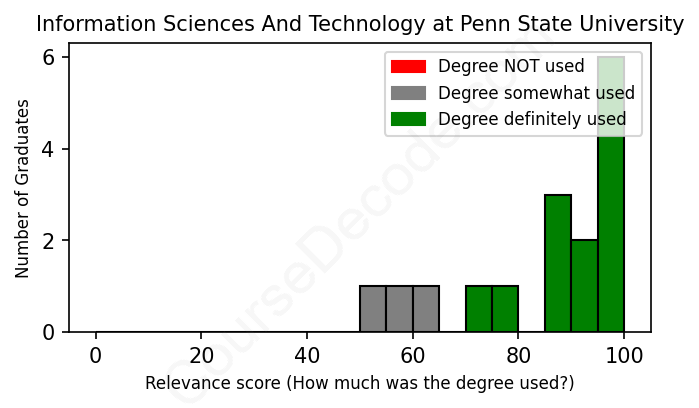
First, some facts. Of the Information Sciences And Technology graduates from Penn State University we've analyzed , here's how many have used (or NOT used) their degree in their career:

These are estimates based on AI analysis of 16 LinkedIn profiles (see below).
The verdict? Significantly above average. Overall, with an average relevance score of 85%, Information Sciences And Technology graduates from Penn State University have a much higher likelihood (+18%) of finding work in this field compared to the average graduate across all fields:
And for comparison, here's the chart for all profiles we've looked at across all degrees.
Also, after graduating, only 0% of these graduates have pursued further education other than another Bachelor's degree (such as a Masters degree or other), compared to the average across all profiles of 35%. This suggests a Bachelors degree is enough for most Information Sciences And Technology graduates, and it's normal to look for work straight after graduation.
See the details:
|
Relevance score: 72% We think this person has gone into a career highly relevant to their degree. We think this person has gone into a career highly relevant to their degree.
DEGREE INFOGraduated in 2018 from Penn State University with a Bachelor's degree in Information Sciences And Technology. No other secondary education since. JOB HISTORY SINCE GRADUATIONTechnical Services Engineer Epic Jul 2018 - Nov 2021 Software Engineer  symplr Nov 2021 - Present ABOUTNo information provided. |
The top 10 most common jobs done by the graduates we've analyzed (ranked most common to least) are:
When looking at the types of jobs that recent graduates from Penn State's Information Sciences and Technology program have landed, you'll notice some common threads. A lot of them are working in fields closely related to IT, software development, cybersecurity, and consulting. Positions like software engineer, IT project manager, and cybersecurity analyst highlight how well-studied skills in programming, risk management, and technology strategy apply to the jobs these graduates are landing. For instance, many graduates have taken on roles at firms like Deloitte and Accenture, where they utilize their technical skills to solve business challenges or implement security measures. This suggests that they’re effectively employing the knowledge gained from their degree in real-world scenarios.
However, not every job is a clear fit for the degree. Some graduates have ventured into positions that don’t heavily rely on their specialized skills, like working as a jewelry production associate or in positions focusing more on operations than on technical expertise. While these roles may include some technical elements, they often lack the depth and breadth that the Information Sciences and Technology program emphasizes. Overall, while many graduates have successfully matched their careers with their educational background, there are a few outliers who have chosen paths less directly linked to their studies.
Here is a visual representation of the most common words in job titles for Information Sciences And Technology graduates (this is across all Information Sciences And Technology graduates we've analyzed, not just those who went to Penn State University):

It seems like graduates from the Information Sciences and Technology program at Penn State University generally find themselves in solid career paths, especially in the tech and consulting sectors. For many of them, their first jobs right after graduation typically relate to IT roles, such as internships or entry-level positions in tech companies. A good number of recent graduates end up at well-respected firms like Deloitte, Accenture, and GE, which is a promising sign that they’re entering the workforce equipped with valuable skills. Over the first few years, it’s common to see these alumni progressing to more advanced positions, taking on roles like consultants, project managers, or even senior technical roles like software engineers or security analysts.
If we look at their career trajectories five or ten years later, many of these individuals continue to climb the ladder, moving into senior management or specialized consultant roles. For instance, alumni who started as analysts or developers often become senior managers or take on executive positions in cybersecurity and risk management. This indicates not just job security, but also significant growth in their careers. While there are exceptions—like those who might venture into unrelated fields or less technical roles—the general trend shows that most graduates are doing well and leveraging their degrees effectively in the tech landscape.
Getting a Bachelor’s degree in Information Sciences and Technology at Penn State can be a mixed bag. It’s definitely not the easiest program out there, but it isn’t the hardest, either. You’ll encounter a good mix of technical stuff like programming and data management, along with some project management and user experience design. If you’re comfortable with math and enjoy problem-solving, you might find it more manageable. However, if you struggle with tech concepts or programming, it could be a bit of a challenge. Overall, it's more demanding than some liberal arts degrees but usually falls somewhere in the average range for STEM programs. Just make sure you keep up with your projects and don’t let the workload pile up—time management is key!
Most commonly, in the LinkedIn profiles we've looked at, it takes people 4 years to finish a Bachelor degree in Information Sciences And Technology.
Looking at these Penn State Information Sciences and Technology grads and their job histories, it seems like many of them are doing pretty well financially. A lot of them have landed positions at big-name companies like Deloitte, Amazon Web Services, and GE, which typically offer competitive salaries and benefits, especially as they move up to senior roles. For instance, the grad who transitioned from Consultant to Senior Manager at Deloitte likely saw a nice bump in pay as their responsibilities grew. Even those starting out have had solid roles that should lead to decent earnings as they gain experience. Overall, it looks like these folks are on the right track to making some good money in their careers!
Here is a visual representation of the most common words seen in the "about" section of LinkedIn profiles who have a Bachelor degree in Information Sciences And Technology (this is across all Information Sciences And Technology graduates we've analyzed, not just those who went to Penn State University). This may or may not be useful:

Here are all colleges offering a Bachelor degree in Information Sciences And Technology (ordered by the average relevance score of their Information Sciences And Technology graduates, best to worst) where we have analyzed at least 10 of their graduates:
| College | Score | Count |
|---|---|---|
 Penn State University Penn State University
|
85 | 16 |